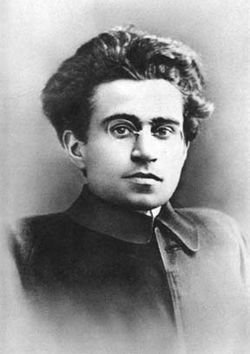Antonio Gramsci
From Kaiserreich

|
Antonio Gramsci (born on Janury 22 1891 in Sardinia, at that time part of the Kingdom of Italy) is an italian politician and the current Chairman of the House of Commons of the Socialist Republic of Italy.
Contents |
Early Life
Gramsci was born on Janury 22 1891 in Ales, on the island of Sardinia, at that time part of the Kingdom of Italy and now of the Italian Federation. He was the fourth of seven sons of Francesco Gramsci, a low-level official of Albanian descent whose financial difficulties and troubles with the police forced the family to move about through several villages in Sardinia. In 1898 Francesco was unjustly convicted of embezzlement and imprisoned, reducing his family to destitution and forcing the young Antonio to abandon his schooling and work at various casual jobs until his father's release in 1904. The boy suffered from health problems: a malformation of the spine owing to a childhood accident left him hunch-backed and underdeveloped, while he was also plagued by various internal disorders throughout his life.
Gramsci completed secondary school in Cagliari, where he lodged with his elder brother Gennaro, a former soldier whose time on the mainland had made him a militant socialist. However, Gramsci's sympathies at the time did not lie with socialism, but rather with the grievances of impoverished Sardinian peasants and miners, who saw their neglect as a result of the privileges enjoyed by the rapidly industrialising North and who tended to turn to Sardinian nationalism as a response.
A brilliant student, in 1911 Gramsci won a scholarship that allowed him to study at the University of Turin, sitting the exam at the same time as future friend Palmiro Togliatti. His worldview shaped by both his earlier experiences in Sardinia and his environment on the mainland, Gramsci joined the Italian Socialist Party in late 1913.
Political Career
Despite showing talent for his studies, Gramsci's financial problems and poor health, as well as his growing political commitment, forced him to abandon his education in early 1915. By this time, he had acquired an extensive knowledge of history and philosophy. From 1914 onward Gramsci's writings for socialist newspapers earned him a reputation as a notable journalist and in 1916 he became co-editor of the Piedmont edition of Avanti!, the Socialist Party official organ. An articulate and prolific writer of political theory, Gramsci proved a formidable commentator, writing on all aspects of Turin's social and political life.
Gramsci was, at this time, also involved in the education and organisation of Turin workers: he spoke in public for the first time in 1916 and gave talks on topics such as the French Revolution, the Paris Commune and the emancipation of women. In the wake of the arrest of Socialist Party leaders that followed the revolutionary riots of August 1917, Gramsci became one of Turin's leading socialists when he was both elected to the party's Provisional Committee and made editor of Il Grido del Popolo.
Role in the Socialist Republic of Italy
After Italy's surrender to Germany, Gramsci became one of the many agitators, Palmiro Togliatti and Benito Mussolini also among them, who called for a revolt against the Austrian occupation. However, the occupation authorities soon decided reprisals and Gramsci had to hide and stop his activity. When his friend Togliatti became one of the prominent exponents of the Anarco-Syndicalist movement in the South of Italy, Gramsci decided to follow him there.
After the successful establishment of the Socialist Republic of Italy in 1921, Gramsci was appointed as General Responsible for Police, where he showed a firm grip in fighting crime. In 1925 the internal tension inside the Anarco-Syndicalist movement grew considerably as disagreements over the direction and the future of the Republic led to violent discussions and even fights. This culminated on September 14 when Angelo Tasca, who pushed for a war of revenge against Austria and Germany, was accused of treason by Gramsci. Gramsci was immediately supported by his friend Togliatti and not even the intervention of Bordiga, who tried to defend Tasca and lower the tones of the discussions, could stop the fight. In the following days Tasca received anonymous death threats and, fearing for his life, decided to flee to the Commune of France. The support for Gramsci grew high whereas Bordiga lost credibility: this was probably the main reason which the following year led to the appointment of Gramsci as the new Chairman of the House of Commons and Togliatti as the new President of the Republic.
In 1931 the Third Congress of the Greater Italian Union confirmed Gramsci as Chairman of the House of Commons; however, his popularity is declining and he may not be able to maintain his seat after the next Congress, which will be held in April 1936.
Personal Life
In 1923 Gramsci married Julia Schucht, a Russian violinist. They had two son, Delio (born on September 5 1924) and Giuliano (born on August 30 1926).
